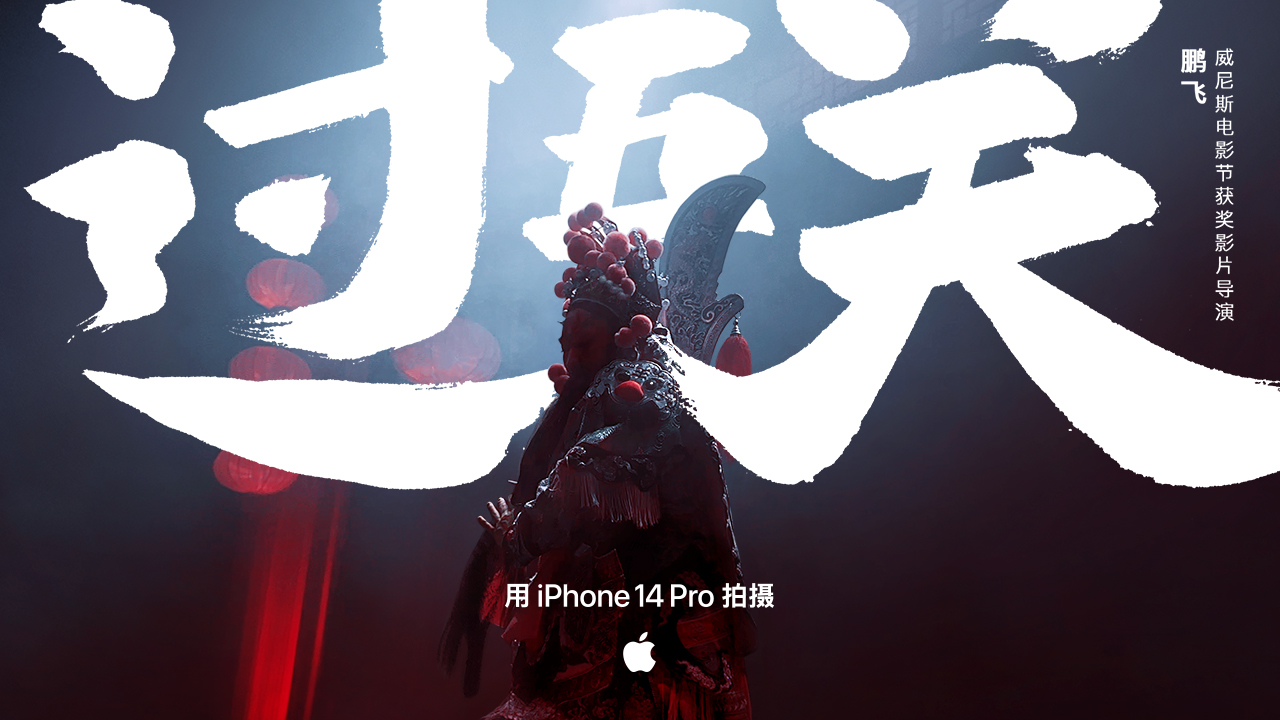Key takeaways:
- Apple released its sixth annual “New Year Blockbuster” aimed at promoting the latest iPhone model in the Chinese market.
- The 17-minute film, “Cross Five Passes”, tells the story of a fictional Peking Opera performer struggling to preserve his art form amid cultural changes in the 1980s.
- A behind-the-scenes special feature was also released, showing consumers how the improved features of the iPhone 14 Pro achieve high-quality visual storytelling.
For the sixth year in a row, Apple has released a short film in honour of the Spring Festival, offering a chance for Apple to display the creative and technological capabilities of its latest iPhone model whilst connecting with consumers on an emotional level. This year’s film, called “Cross Five Passes” follows the story of a fictional Beijing opera performer named Zhao Hui as he struggles through the hardships of training, family crisis, and finally the rise of new, more popular forms of entertainment.
Crossing five passes: Hardship through changing times
The audience first meets the adult Zhao Hui in 1987 as he and his troupe prepare for a performance of the opera “Cross Five Passes”. They look out of place next to the other acts, who are all singers and dancers performing new pop hits. The film then cuts back and forth between the backstage preparation taking place in 1987 and pivotal moments in the life of Zhao Hui.
This year’s film, called “Cross Five Passes” follows the story of a fictional Beijing opera performer named Zhao Hui.
In a scene instantly recognisable to audiences worldwide due to the acclaimed film “Farewell My Concubine”, the film shows Zhao Hui as an opera trainee, not older than 10 or 11 years old. He is being berated by his trainer, who is also his sole guardian, having been given up by his parents in order to train full-time to become an opera performer. In another scene from the past, Zhao Hui makes a mistake that ruins a performance and as his trainer once again chastises him, it is revealed that Zhao Hui has just been told his father is dying.
Back in the present day, the opera performers are informed they must cut their performance down from 20 minutes to 5 to make room for the more popular modern acts. Not willing to bear the indignity of this, the troupe quit the performance, leaving Zhao Hui to perform the opera on his own. The film culminates with Zhao Hui making his solo performance and imagining cheers filling a packed traditional opera house.
The film’s title comes from the Chinese idiom “cross five passes and slays six captains” whose figurative meaning is to face countless challenges on one’s path to success. This title is a clear nod to pandemic times, inspiring viewers of all ages to reflect on the difficulties they have overcome to preserve their own ways of life. After the final scene, the film closes with the words “dedicated to you who crossed five passes and slayed six captains”.
The film’s title comes from the Chinese idiom “cross five passes and slays six captains”.
This is followed by the images of several real Beijing opera performers, showing their age and the number of years they have been performing. They are all veterans, having started as early as 8 or 9 years old, just like the fictional protagonist Zhao Hui, leaving viewers with the knowledge that despite the hardships, this art form continues to be handed down.
“Cross Five Passes” diverges significantly from typical Spring Festival campaigns, which feature themes of returning home, family reunion, and bridging the generational divide. However, this holiday season denoted not just a homecoming, but rather the end of the year of greatest collective suffering and instability in China since the pandemic began. The film avoids acknowledging the pandemic head-on, using a Beijing opera performer as a metaphor for the perseverance of the Chinese nation in the face of unprecedented global circumstances.
New technology as a tool for preserving cultural heritage
Apple makes a striking choice in this campaign to align its own brand with a sense of reflection and sadness over the passage of time. This bittersweet message on the surface seems ill-fitted to promote the release of cutting-edge smartphone technology, but the accompanying behind-the-scenes film shows why this is not the case.
The behind-the-scenes video shows how features of the iPhone 14 Pro were utilised to shoot the film, with the particularly impressive Action mode allowing motion-filled tracking shots to appear perfectly steady and clear. The director Peng Fei also discusses the challenges the cast and crew had to surmount in order to create the film, echoing the film’s theme of “crossing give passes and slaying six captains” in order to finally reach one’s destination.
Apple makes a striking choice in this campaign to align its own brand with a sense of reflection and sadness over the passage of time.
Apple frames their own product as going beyond the latest technological fad, showing it as a storytelling tool and a way to connect with the past, capturing the beauty and intricate detail of tradition more sharply than ever before.
On Weibo Peng Fei shared that this project was the most arduous and yet most addictive film he has worked on and expressed his hope that Beijing opera will continue to be handed down from generation to generation. Although the film focusses on the preservation of this particular art form, it also deals with a more broadly resonant theme of uniting modernisation with reflection, a comforting message that hits at a core anxiety of 21st century China.









